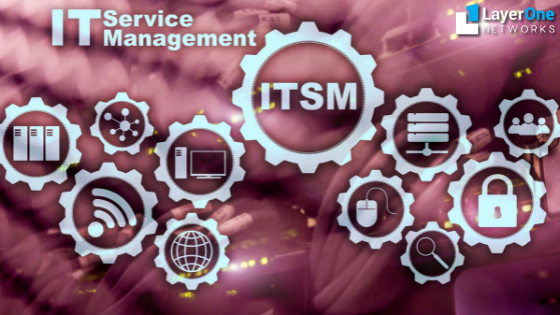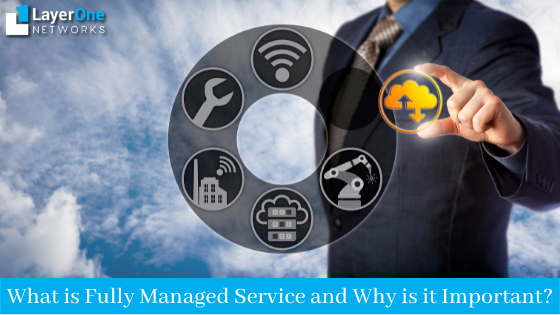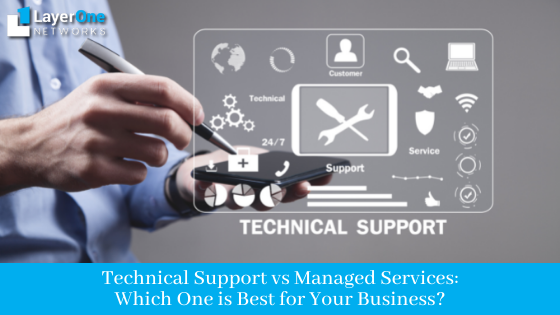A fully managed IT service can be a great option for companies that don’t have the time or resources to manage their servers or are looking for experts to manage and maintain the infrastructure without any hiccups.
A fully managed service can provide everything from proactive IT operations and streamlined ticketing for all IT issues to remote monitoring and management software for key IT infrastructure. It frees up your time from managing the IT-related tasks so that you can focus on your core business.
In this blog, let’s look at how managed IT services can help you and everything that’s included in it.
How Can a Managed IT Service Provider Help?

Streamlined, Efficient Support
We can help you with everything from setting up your new computer, to upgrading your software and hardware, to fixing issues (if they do occur) daily. We’ll take care of all the technical support tasks, so you don’t have to.
One person will be assigned as your primary contact for all IT needs — from troubleshooting an issue in the office or fixing your home network connection at night when you get home from work. This means no more getting passed around between different teams and departments!
Proactive Reporting and Analysis
Fully Managed Service also includes proactive reporting and analysis. This is regularly monitoring your business to ensure that everything is running smoothly and efficiently and identifying any problems before they become more severe. In addition to checking key metrics, our team will conduct in-depth reviews of your business to make sure everything’s on track—or if there are any changes, we can optimize performance.
Vendor Coordination and Management
Vendor coordination is one of the critical foundations of IT managed services. This function ensures that your vendor partners work together to deliver consistent service quality across different areas, such as network operations, customer support, and billing. Your IT consulting firm offering managed IT services will operate as a central point of contact for all issues related to service delivery, including:
- Vendor selection: Work with an expert in managing vendors to find the right partner for each component of your cloud infrastructure or application stack. This may include setting up contracts with third-party vendors like power companies or Internet service providers (ISPs).
- Vendor evaluation: Get help from experts who can review your current vendors’ offerings against industry benchmarks and standards. They’ll identify opportunities where you might get better value by switching suppliers or renegotiating contracts on price or other terms of service.
High Availability
As a managed service provider, our goal is to deliver high availability, high security, and high performance.
High availability refers to the ability of a system to be available for use during a specific time period. In other words, it’s the amount of time your service will remain accessible before you have to start worrying about it being down.
We don’t want anything less than 100% uptime for all of our clients so we work hard every day towards making sure that their websites are live and serving customers around the clock without any interruptions whatsoever.
What is Included in a Fully Managed IT Service?

There are several functions included in fully managed IT services, but here are a top few:
Network security & risk mitigation: This service ensures that your network is safe from any kind of attack or intrusion. It also helps you to manage risks by identifying potential vulnerabilities in your network.
Endpoint detection & response (EDR): EDR helps you to detect malware on all of your devices so that you can remove it before it causes any damage or infection to your system.
Desktop virtualization: Desktop virtualization allows you to access your desktop remotely so that you can work from anywhere and everywhere. This also helps to improve productivity by reducing travel time and costs associated with having multiple locations for businesses.
Data backup & recovery: Data backup & recovery ensures that all of your important data is safe, even if something happens to the device on which it was stored or if someone accidentally deleted it accidentally or maliciously deletes it intentionally!
What are the Different Types of Fully Managed IT Services?

- Managed Cloud Services: Some businesses prefer to outsource their IT support while others choose to manage it independently. With managed cloud services, your company gets full-service IT support with the flexibility of using a public cloud to have security and cost-effectiveness. You can consult with the provider to find the best plans.
- Managed Hosting: A managed hosting solution combines web hosting, server management, and disaster recovery into one package. It provides all the necessary hardware and software to run your website or application in an environment where someone else monitors its performance, maintains backups, and patches any vulnerabilities as needed — all at a low cost per month compared to other options like hiring in-house personnel or purchasing expensive dedicated servers yourself.
- Managed Security: We conduct regular security checks on your system and protect against malware, virus, and other online threats. Each device always has up-to-date protection against viruses, worms, and spyware—no matter where those threats originate.
Hire a Trusted Fully Managed IT Service Provider
As your needs grow, you will look for a reliable and trusted provider. You want to know your provider is dependable. You want a provider with the experience needed to take your business to the next level. An ideal IT service provider can help you through challenges and make sure everything runs smoothly in the background.
This is where our IT consultant service shines. We provide managed IT services for our clients in Corpus Christi, helping them maintain their IT infrastructure so that it doesn’t get in the way of their everyday operations.
Want to know more about how we can help you? Reach out to us now to discuss your need for IT services.





